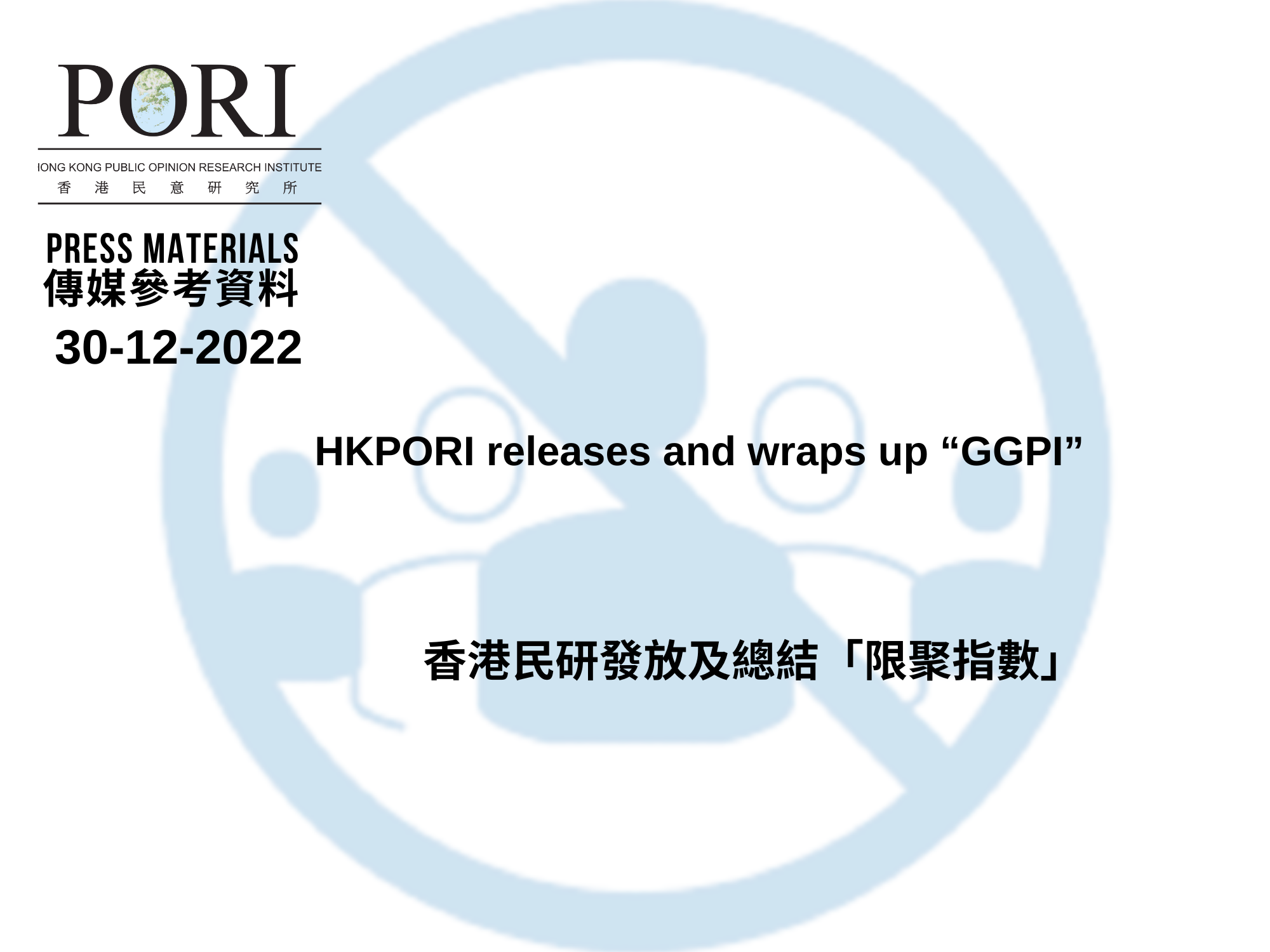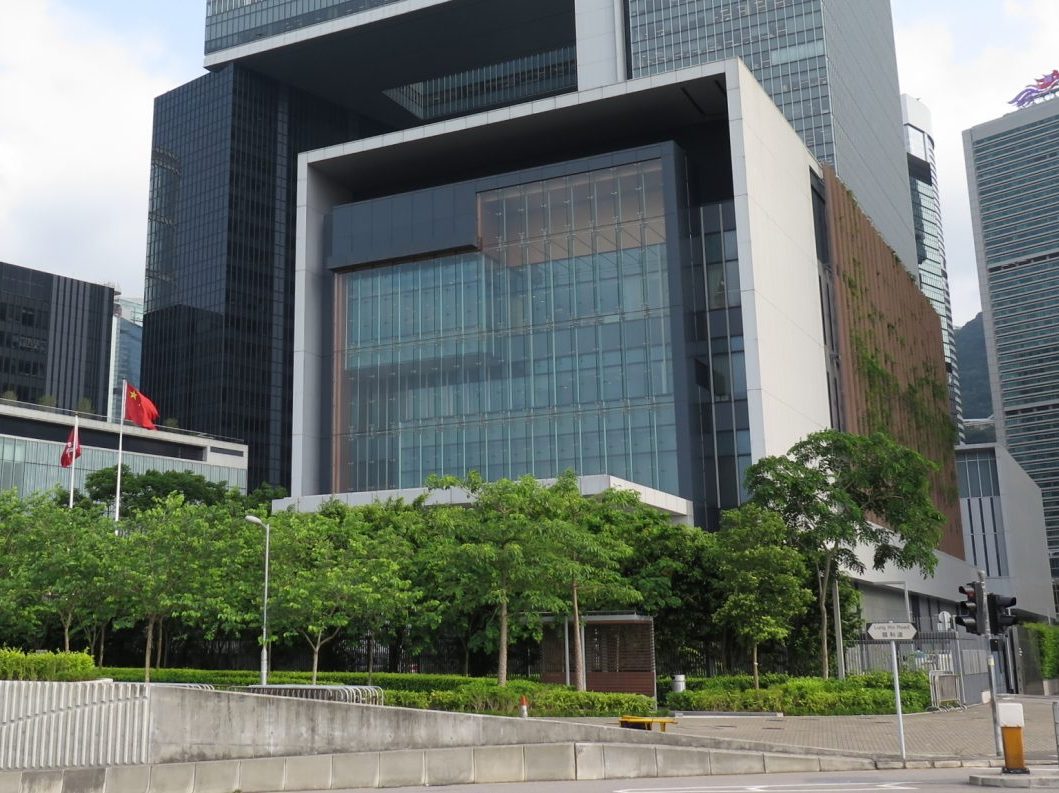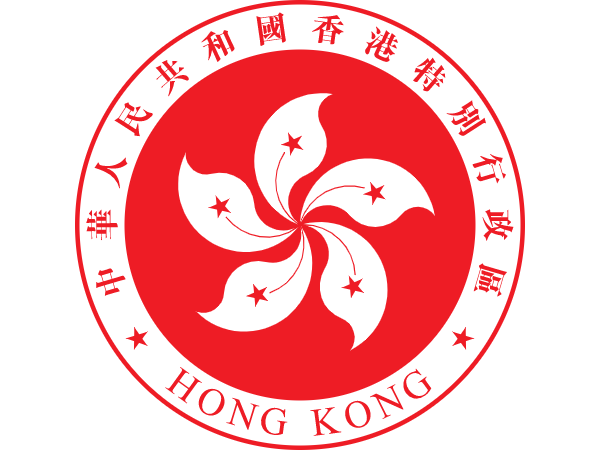Oct 26, 2021
Hong Kong Public Opinion Research Institute Press Conference – Press Materials
Speakers:
Kim-Wah Chung – Deputy CEO, HKPORI
Wai-Sum Kung – Former Chairman of Hong Kong Policy Viewers, part-time lecturer and social worker of youth work
Edward Tai – Manager (Data Science), HKPORI
Detailed Findings
Special Announcement
The predecessor of Hong Kong Public Opinion Program (HKPOP) was The Public Opinion Programme at The University of Hong Kong (HKUPOP). “POP” in this release can refer to HKPOP or its predecessor HKUPOP.
Abstract
POP successfully interviewed 1,000 Hong Kong residents by a random telephone survey conducted by real interviewers in late October. Our survey shows that the latest popularity rating of CE Carrie Lam is 37.0 marks, with 32% of respondents giving her 0 mark. Her net popularity stands at negative 42 percentage points. The rating and net popularity have not changed significantly compared to half a month ago. Regarding the HKSAR Government, the latest net satisfaction stands at negative 29 percentage points, registering another record high since May 2019, while the net trust value stands at negative 6 percentage points, registering a record high since January 2019. As for people’s satisfaction with the current economic, livelihood and political conditions, the net satisfaction rates are negative 26, negative 27 and negative 28 percentage points respectively. The net satisfaction rate of livelihood condition has registered a record high since December 2018. Regarding Taiwan and Tibetan issues, Hong Kong people’s net confidence in the ultimate reunification across the strait stands at negative 9 percentage points, which has increased by 9 percentage points from half a year ago. Although the change has not gone beyond sampling error, the net confidence has registered a record high since 2012. Regarding international space, net support in Taiwan’s rejoining the United Nations stands at positive 2 percentage points, registering another record low since 2011. Meanwhile, net value in believing “one country, two systems” was applicable to Taiwan stands at negative 18 percentage points, registering a record high since 2018. As for the independence of Taiwan, net support stands at negative 29 percentage points, which has dropped significantly by 10 percentage points from half a year ago, registering a record low since 2017. Regarding Tibetan issues, net support in the independence of Tibet stands at negative 37 percentage points, which has not changed much from half a year ago. As for the PSI, the latest figure is 86.5, up by 1.1 points from early October. The effective response rate of the survey is 52.2% respectively. The maximum sampling error of percentages is +/-4%, that of net values is +/-8% and that of ratings is +/-2.1 at 95% confidence level.
Contact Information
| Date of survey | : | 18-22/10/2021 |
| Survey method | : | Random telephone survey conducted by real interviewers |
| Target population | : | Cantonese-speaking Hong Kong residents aged 18 or above |
| Sample size[1] | : | 1,000 (including 500 landline and 500 mobile samples) |
| Effective response rate | : | 52.2% |
| Sampling error[2] | : | Sampling error of percentages not more than +/-4%, that of net values not more than +/-8% and that of ratings not more than +/-2.1 at 95% conf. level |
| Weighting method | : | Rim-weighted according to figures provided by the Census and Statistics Department. The gender-age distribution of the Hong Kong population came from “Mid-year population for 2020”, while the educational attainment (highest level attended) distribution and economic activity status distribution came from “Women and Men in Hong Kong – Key Statistics (2020 Edition)”. |
[1] This figure is the total sample size of the survey. Some questions may only involve a subsample, the size of which can be found in the tables below.
[2] All error figures in this release are calculated at 95% confidence level. “95% confidence level” means that if we were to repeat a certain survey 100 times with different random samples, we would expect 95 times having the population parameter within the respective error margins calculated. Because of sampling errors, when quoting percentages, journalists should refrain from reporting decimal places, whereas one decimal place can be used when quoting rating figures.
Popularity of CE and SAR Government
Recent popularity figures of CE Carrie Lam are summarized as follows:
| Date of survey | 9-12/8/21 | 20-26/8/21 | 6-10/9/21 | 16-23/9/21 | 4-7/10/21[3] | 18-22/10/21 | Latest change |
| Sample size | 1,002 | 1,003 | 1,000 | 1,036 | 1,010 | 1,000 | — |
| Response rate | 49.4% | 52.9% | 44.2% | 44.1% | 62.9% | 52.2% | — |
| Latest findings | Finding | Finding | Finding | Finding | Finding | Finding & error | — |
| Rating of CE Carrie Lam | 35.1 | 33.8 | 35.6 | 33.9 | 38.3[4] | 37.0+/-2.1 | -1.3 |
| Vote of confidence in CE Carrie Lam | 20% | 20% | 24%[4] | 20%[4] | 24%[4] | 22+/-3% | -2% |
| Vote of no confidence in CE Carrie Lam | 66% | 68% | 65% | 66% | 59%[4] | 64+/-3% | +5%[4] |
| Net approval rate | -46% | -48% | -41% | -46% | -35%[4] | -42+/-5% | -7% |
[3] POP conducted a Policy Address instant survey on 6/10/2021 in between two tracking surveys, the results are: CE rating at 30.5 marks, net approval rate at negative 48 percentage points. Because our tracking surveys do not use online samples, and our latest survey started two days before the Policy Address, it is better to compare the latest figures with those collected in our previous survey conducted on 16-23/9/2021.
[4] The difference between the figure and the result from the previous survey has gone beyond the sampling error at 95% confidence level, meaning that the change is statistically significant prima facie. However, whether the difference is statistically significant is not the same as whether they are practically useful or meaningful, and different weighting methods could have been applied in different surveys.
Recent popularity figures of the HKSAR Government are summarized as follows:
| Date of survey | 17-21/5/21 | 21-25/6/21 | 19-22/7/21 | 20-26/8/21 | 16-23/9/21 | 18-22/10/21 | Latest change |
| Sample size | 566-646 | 544-583 | 564-624 | 651-662 | 666-703 | 598-622 | — |
| Response rate | 52.5% | 49.3% | 48.5% | 52.9% | 44.1% | 52.2% | — |
| Latest findings | Finding | Finding | Finding | Finding | Finding | Finding & error | — |
| Satisfaction rate of SARG performance[5] | 17% | 24%[6] | 24% | 21% | 25% | 26+/-3% | +1% |
| Dissatisfaction rate of SARG performance[5] | 63% | 60% | 58% | 59% | 54% | 55+/-4% | — |
| Net satisfaction rate | -46% | -36%[6] | -34% | -38% | -30% | -29+/-7% | +1% |
| Mean value[5] | 2.1 | 2.3[6] | 2.3 | 2.3 | 2.4 | 2.4+/-0.1 | — |
| Trust in HKSAR Government[5] | 31% | 34% | 38% | 34% | 35% | 38+/-4% | +3% |
| Distrust in HKSAR Government[5] | 54% | 52% | 50% | 50% | 48% | 44+/-4% | -4% |
| Net trust | -22% | -18% | -12% | -16% | -13% | -6+/-7% | +7% |
| Mean value[5] | 2.5 | 2.6 | 2.7 | 2.6 | 2.6 | 2.7+/-0.1 | +0.1 |
[5] Collapsed from a 5-point scale. The mean value is calculated by quantifying all individual responses into 1, 2, 3, 4, 5 marks according to their degree of positive level, where 1 is the lowest and 5 the highest, and then calculate the sample mean.
[6] The difference between the figure and the result from the previous survey has gone beyond the sampling error at 95% confidence level, meaning that the change is statistically significant prima facie. However, whether the difference is statistically significant is not the same as whether they are practically useful or meaningful, and different weighting methods could have been applied in different surveys.
People’s recent appraisals of society’s conditions are summarized as follows:
| Date of survey | 17-21/5/21 | 21-25/6/21 | 19-22/7/21 | 20-26/8/21 | 16-23/9/21 | 18-22/10/21 | Latest change |
| Sample size | 1,004 | 1,014 | 1,000 | 1,003 | 1,036 | 1,000 | — |
| Response rate | 52.5% | 49.3% | 48.5% | 52.9% | 44.1% | 52.2% | — |
| Latest findings | Finding | Finding | Finding | Finding | Finding | Finding & error | — |
| Current economic condition: Satisfaction rate[7] | 17%[8] | 18% | 20% | 23% | 21% | 25+/-3% | +4%[8] |
| Current economic condition: Dissatisfaction rate[7] | 60% | 56%[8] | 54% | 51% | 53% | 51+/-3% | -2% |
| Net satisfaction rate | -43% | -38% | -33% | -28% | -32% | -26+/-5% | +6% |
| Mean value[7] | 2.3 | 2.4[8] | 2.4 | 2.5 | 2.4 | 2.5+/-0.1 | +0.1 |
| Current livelihood condition: Satisfaction rate[7] | 18% | 19% | 21% | 20% | 23% | 25+/-3% | +1% |
| Current livelihood condition: Dissatisfaction rate[7] | 62% | 56%[8] | 57% | 54% | 52% | 52+/-3% | -1% |
| Net satisfaction rate | -44% | -36%[8] | -36% | -34% | -29% | -27+/-5% | +2% |
| Mean value[7] | 2.2 | 2.4[8] | 2.4 | 2.4 | 2.5 | 2.4+/-0.1 | — |
| Current political condition: Satisfaction rate[7] | 20% | 20% | 26%[8] | 24% | 28%[8] | 25+/-3% | -3% |
| Current political condition: Dissatisfaction rate[7] | 61% | 61% | 57%[8] | 58% | 54% | 53+/-3% | -1% |
| Net satisfaction rate | -40% | -41% | -30%[8] | -34% | -25%[8] | -28+/-5% | -3% |
| Mean value[7] | 2.1 | 2.1 | 2.3[8] | 2.3 | 2.4[8] | 2.4+/-0.1 | — |
[7] Collapsed from a 5-point scale. The mean value is calculated by quantifying all individual responses into 1, 2, 3, 4, 5 marks according to their degree of positive level, where 1 is the lowest and 5 the highest, and then calculate the sample mean.
[8] The difference between the figure and the result from the previous survey has gone beyond the sampling error at 95% confidence level, meaning that the change is statistically significant prima facie. However, whether the difference is statistically significant is not the same as whether they are practically useful or meaningful, and different weighting methods could have been applied in different surveys.
Our latest survey shows that the popularity rating of CE Carrie Lam is 37.0 marks, with 32% of respondents giving her 0 mark. Her approval rate is 22%, disapproval rate 64%, giving a net popularity of negative 42 percentage points. The rating and net popularity have not changed significantly compared to half a month ago.
Regarding the HKSAR Government, the latest satisfaction rate is 26%, whereas dissatisfaction rate stands at 55%, thus the net satisfaction is negative 29 percentage points, registering another record high since May 2019. The mean score is 2.4, meaning between “quite dissatisfied” and “half-half” in general. Regarding people’s trust in the HKSAR Government, 38% of the respondents expressed trust, 44% expressed distrust, thus the net trust value is negative 6 percentage points, registering a record high since January 2019. The mean score is 2.7, meaning between “quite distrust” and “half-half” in general. All these figures have not changed much from a month ago.
As for people’s satisfaction with the current economic, livelihood and political conditions, all the latest satisfaction rates are 25%, while the net satisfaction rates are negative 26, negative 27 and negative 28 percentage points respectively. The mean scores fall within 2.4 and 2.5, meaning between “quite dissatisfied” and “half-half” in general. All three net satisfaction rates have not changed significantly compared to a month ago, but that of livelihood condition has registered a record high since December 2018.
Taiwan and Tibetan Issues
People’s latest views towards various Taiwan and Tibetan issues are summarized below:
| Date of survey | 2-8/7/19 | 3-8/1/20 | 19-22/10/20 | 19-22/4/21 | 18-22/10/21 | Latest change |
| Sample size[8] | 575-648 | 585-657 | 593-629 | 592-613 | 583-614 | — |
| Response rate | 67.4% | 72.0% | 62.2% | 54.5% | 52.2% | — |
| Latest findings | Finding | Finding | Finding | Finding | Finding & error | — |
| Confidence in cross-strait reunification | 27% | 19%[10] | 26%[10] | 33%[10] | 37+/-4% | +4% |
| No confidence in cross-strait reunification | 65% | 72%[10] | 61%[10] | 51%[10] | 46+/-4% | -5% |
| Net confidence | -38% | -53%[10] | -36%[10] | -18%[10] | -9+/-8% | +9% |
| Taiwan rejoining the United Nations: Support rate | 57% | 63% | 53%[10] | 44%[10] | 40+/-4% | -5% |
| Taiwan rejoining the United Nations: Opposition rate | 27% | 26% | 27% | 38%[10] | 37+/-4% | — |
| Net support | 31% | 36% | 26%[10] | 6%[10] | 2+/-7% | -4% |
| Believe “one country, two systems” is applicable to Taiwan | 27% | 21%[10] | 18% | 27%[10] | 31+/-4% | +5% |
| Believe “one country, two systems” is not applicable to Taiwan | 63% | 66% | 63% | 50%[10] | 49+/-4% | -1% |
| Net value of applicability | -36% | -45% | -45% | -23%[10] | -18+/-7% | +5% |
| Taiwan independence: Support rate | 44%[10] | 48% | 41%[10] | 32%[10] | 26+/-4% | -6%[10] |
| Taiwan independence: Opposition rate | 44%[10] | 39%[10] | 41% | 50%[10] | 55+/-4% | +5% |
| Net support | 0%[10] | 9% | 0% | -18%[10] | -29+/-7% | -10%[10] |
| Tibet independence: Support rate | 26%[10] | 34%[10] | 28% | 19%[10] | 18+/-3% | -1% |
| Tibet independence: Opposition rate | 53% | 46%[10] | 41% | 57%[10] | 55+/-4% | -2% |
| Net support | -27%[10] | -13%[10] | -13% | -38%[10] | -37+/-6% | +1% |
[9] Before March 2020, weighted count was used to report subsample size. Starting from March 2020, raw count was used instead.
[10] The difference between the figure and the result from the previous survey has gone beyond the sampling error at 95% confidence level, meaning that the change is statistically significant prima facie. However, whether the difference is statistically significant is not the same as whether they are practically useful or meaningful, and different weighting methods could have been applied in different surveys.
The latest survey reveals that 37% of Hong Kong people interviewed were confident in the ultimate reunification across the strait while 46% expressed no confidence. Net confidence stands at negative 9 percentage points, which has increased by 9 percentage points from half a year ago. Although the change has not gone beyond sampling error, the net confidence has registered a record high since 2012. Regarding international space, 40% supported Taiwan’s rejoining the United Nations while 37% opposed that. Net support stands at positive 2 percentage points, registering another record low since 2011. Meanwhile, 31% believed “one country, two systems” was applicable to Taiwan while 49% believed it was not. Net value of applicability stands at negative 18 percentage points, registering a record high since 2018. As for the independence of Taiwan, 26% supported Taiwan’s independence while 55% opposed it. Net support stands at negative 29 percentage points, which has dropped significantly by 10 percentage points from half a year ago, registering a record low since 2017. Regarding Tibetan issues, 55% of Hong Kong people interviewed opposed the independence of Tibet whereas 18% showed support. Net support stands at negative 37 percentage points, which has not changed much from half a year ago.
Public Sentiment Index
The Public Sentiment Index (PSI) compiled by POP aims at quantifying Hong Kong people’s sentiments, in order to explain and predict the likelihood of collective behaviour. PSI comprises 2 components: one being Government Appraisal (GA) Score and the other being Society Appraisal (SA) Score. GA refers to people’s appraisal of society’s governance while SA refers to people’s appraisal of the social environment. Both GA and SA scores are compiled from a respective of 4 and 6 opinion survey figures. All PSI, GA and SA scores range between 0 to 200, with 100 meaning normal.
The chart of PSI, GA and SA are shown below:
 | |||
| Latest figure | Public Sentiment Index (PSI): 86.5 (+1.1) | Government Appraisal (GA): 80.5 (+0.9) | Society Appraisal (SA): 88.1 (+1.1) |
Recent values of PSI, GA, SA and 10 fundamental figures are tabulated as follows:
| Cut-off date | 12/8/21 | 26/8/21 | 10/9/21 | 23/9/21 | 7/10/21 | 22/10/21 | Latest change |
| Public Sentiment Index (PSI) | 81.3 | 80.7 | 81.6 | 83.5 | 85.4 | 86.5 | +1.1 |
| Government Appraisal (GA) | 76.1 | 73.7 | 75.4 | 76.3 | 79.6 | 80.5 | +0.9 |
| Rating of CE | 35.1 | 33.8 | 35.6 | 33.9 | 38.3 | 37.0 | -1.3 |
| Net approval rate of CE | -46% | -48% | -41% | -46% | -35% | -42% | -7% |
| Mean value of people’s satisfaction with SARG | 2.3[11] | 2.3 | 2.3[11] | 2.4 | 2.4[11] | 2.4 | — |
| Mean value of people’s trust in SARG | 2.7[11] | 2.6 | 2.6[11] | 2.6 | 2.6[11] | 2.7 | +0.1 |
| Society Appraisal (SA) | 83.3[11] | 84.5 | 84.5[11] | 87.0 | 87.0[11] | 88.1 | +1.1 |
| People’s satisfaction with political condition | 2.3[11] | 2.3 | 2.3[11] | 2.4 | 2.4[11] | 2.4 | — |
| Weighting index of political condition | 0.31[11] | 0.31[11] | 0.31[11] | 0.31[11] | 0.31[11] | 0.31[11] | — |
| People’s satisfaction with economic condition | 2.4[11] | 2.5 | 2.5[11] | 2.4 | 2.4[11] | 2.5 | +0.1 |
| Weighting index of economic condition | 0.34[11] | 0.34[11] | 0.34[11] | 0.34[11] | 0.34[11] | 0.34[11] | — |
| People’s satisfaction with livelihood condition | 2.4[11] | 2.4 | 2.4[11] | 2.5 | 2.5[11] | 2.4 | — |
| Weighting index of livelihood condition | 0.35[11] | 0.35[11] | 0.35[11] | 0.35[11] | 0.35[11] | 0.35[11] | — |
[11] POP will adopt the latest published figures when there are no respective updates.
As for the meaning of the score values, please refer to the following:
| Score value | Percentile | Score value | Percentile |
| 140-200 | Highest 1% | 0-60 | Lowest 1% |
| 125 | Highest 5% | 75 | Lowest 5% |
| 120 | Highest 10% | 80 | Lowest 10% |
| 110 | Highest 25% | 90 | Lowest 25% |
| 100 being normal level, meaning half above half below | |||
The latest PSI stands at 86.5, up by 1.1 points from early October. It can be considered as among the worst 18% across the past 20 years or so. Among the two component scores of PSI, the Government Appraisal (GA) Score that reflects people’s appraisal of society’s governance increases by 0.9 point to 80.5, whereas the Society Appraisal (SA) Score that reflects people’s appraisal of the social environment increases by 1.1 points to 88.1. They can be considered as among the worst 10% and 21% across the past 20 years or so respectively. All three figures have again registered their record high since early June 2019.
Opinion Daily
In 2007, POP started collaborating with Wisers Information Limited whereby Wisers supplies to POP a record of significant events of that day according to the research method designed by POP. These daily entries would then become “Opinion Daily” after they are verified by POP.
For some of the polling items covered in this press release, the previous survey was conducted from 19 to 22 April, 2021 while this survey was conducted from 18 to 22 October, 2021. During this period, herewith the significant events selected from counting newspaper headlines and commentaries on a daily basis and covered by at least 25% of the local newspaper articles. Readers can make their own judgment if these significant events have any impacts to different polling figures.
| 9/10/21 | The Observatory revises its forecast of tropical cyclone warning signals repeatedly. |
| 8/10/21 | The government publishes the “Hong Kong 2030+” strategic planning final report. |
| 8/10/21 | The Observatory issues the Black Rainstorm Warning Signal as tropical storm Lionrock approaches. |
| 7/10/21 | The Policy Address proposes developing the “Northern Metropolis”. |
| 6/10/21 | Carrie Lam delivers the last Policy Address during her term of office. |
| 1/10/21 | The government holds a flag-raising ceremony and a reception in celebration of the National Day. |
| 27/9/21 | Senior police inspector Kary Lam falls into the sea and dies while pursuing smuggling speedboats. |
| 24/9/21 | China’s Ministry of Foreign Affairs publishes the “Fact Sheet: U.S. Interference in Hong Kong Affairs and Support for Anti-China, Destabilizing Forces”. |
| 20/9/21 | 364 members of the Election Committee are elected. |
| 20/9/21 | Various property stocks plummet while rumour has it that the Central Government is putting pressure on Hong Kong property developers. |
| 24/8/21 | The government further amends the “Film Censorship Ordinance” to ban exhibition of films that are contrary to the interests of national security. |
| 18/8/21 | Police arrests four members of the HKU Students’ Union who allegedly advocated terrorism. |
| 15/8/21 | Civil Human Rights Front announces its disbandment. |
| 10/8/21 | The Hong Kong Professional Teachers’ Union announces it will be dissolved. |
| 31/7/21 | The Education Bureau terminates all working relations with Hong Kong Professional Teachers’ Union. |
| 30/7/21 | Tong Ying-kit is jailed for 9 years for inciting secession and terrorism. |
| 16/7/21 | Xia Baolong spells out five qualities people who govern Hong Kong must possess. |
| 4/7/21 | Police arrests two people who allegedly incited violence online. |
| 3/7/21 | The government calls the July 1 stabbing a “lone wolf terrorist attack”. |
| 2/7/21 | A man kills himself after stabbing a police officer in Causeway Bay. |
| 1/7/21 | Xi Jinping delivers a speech at Chinese Communist Party’s 100th anniversary ceremony. |
| 25/6/21 | John Lee, Chris Tang and Raymond Siu are appointed as Chief Secretary, Secretary for Security and Commissioner of Police respectively. |
| 23/6/21 | Apple Daily prints one million copies of its final issue. |
| 17/6/21 | Police arrests senior executives of Apple Daily and freezes assets of the company under the national security law. |
| 14/6/21 | G7 summit ends and issues communique that mentions China multiple times. |
| 12/6/21 | Luo Huining says people who shout “end one-party rule” are enemies of Hong Kong. |
| 11/6/21 | The government amends the “Film Censorship Ordinance” to ban exhibition of films that endanger national security. |
| 10/6/21 | NPCSC passes “Anti-Foreign Sanctions Law”. |
| 4/6/21 | Police locks down Victoria Park to prevent June 4 vigil. |
| 28/5/21 | 10 famous democrats are convicted and jailed for 10.1 assembly. |
| 27/5/21 | The Legislative Council passes amendments to Hong Kong’s electoral system. |
| 15/5/21 | Taiwan confirms 180 local infections with coronavirus disease. |
| 14/5/21 | The government freezes Jimmy Lai’s personal assets under the national security law. |
Data Analysis
Our survey shows that the latest popularity rating of CE Carrie Lam is 37.0 marks, with 32% of respondents giving her 0 mark. Her net popularity stands at negative 42 percentage points. The rating and net popularity have not changed significantly compared to half a month ago. Regarding the HKSAR Government, the latest net satisfaction stands at negative 29 percentage points, registering another record high since May 2019, while the net trust value stands at negative 6 percentage points, registering a record high since January 2019. As for people’s satisfaction with the current economic, livelihood and political conditions, the net satisfaction rates are negative 26, negative 27 and negative 28 percentage points respectively. The net satisfaction rate of livelihood condition has registered a record high since December 2018.
Regarding Taiwan and Tibetan issues, Hong Kong people’s net confidence in the ultimate reunification across the strait stands at negative 9 percentage points, which has increased by 9 percentage points from half a year ago. Although the change has not gone beyond sampling error, the net confidence has registered a record high since 2012. Regarding international space, net support in Taiwan’s rejoining the United Nations stands at positive 2 percentage points, registering another record low since 2011. Meanwhile, net value in believing “one country, two systems” was applicable to Taiwan stands at negative 18 percentage points, registering a record high since 2018. As for the independence of Taiwan, net support stands at negative 29 percentage points, which has dropped significantly by 10 percentage points from half a year ago, registering a record low since 2017. Regarding Tibetan issues, net support in the independence of Tibet stands at negative 37 percentage points, which has not changed much from half a year ago.
As for the PSI, the latest figure is 86.5, up by 1.1 points from early October.




